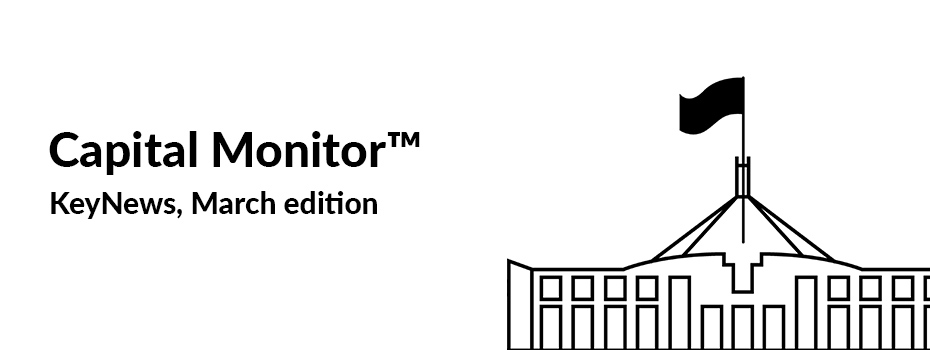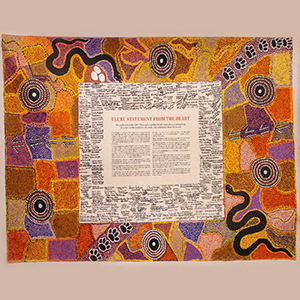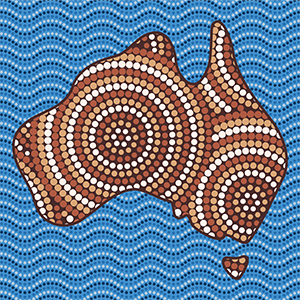
Capital Monitor™ | KeyNews March 2023 Edition
05 March 2023 05:58
A fair way to go before we see an Indigenous Voice to Parliament, track the latest with Capital Monitor™
"And together, we can embrace the Uluru Statement from the Heart. We can answer its patient, gracious call for a Voice enshrined in our Constitution. Because all of us ought to be proud that amongst our great multicultural society, we count the oldest living continuous culture in the world."
Prime Minister Anthony Albanese declared these words on Election Night, 21 May 2022, in front of a group of supporters he had already told to ‘dial it down’. In doing so, Mr Albanese propelled the idea of a Voice to Parliament into the collective Australian consciousness. By pledging support to the Uluru Statement in his May 2022 victory speech, Prime Minister Anthony Albanese set the tone for a referendum in his first term in Government.
Uluru Statement from the Heart

The concept of a First Nations Voice to Parliament originated from the Uluru Statement from the Heart, which was released in May 2017. The Uluru Statement from the Heart involved a four-day convention held by delegates to the First Nations National Constitutional Convention. This convention had bipartisan support and involved 250+ Aboriginal and Torres Strait Islander leaders. Its aim was to develop a discussion paper created by the Referendum Council. The Referendum Council, established by former Prime Minister Malcolm Turnbull and Former Opposition Leader Bill Shorten in 2015, was created to advise the Government on constitutional recognition of Aboriginal and Torres Strait Islander peoples. The Referendum Council engaged in consultation and discussions with community groups and individuals, resulting in the development of the discussion paper which they used to guide the convention.
At the conclusion of the convention, the Uluru Statement from the Heart was created with two objectives: the creation of a First Nations Voice and the establishment of a Makarrata Commission.
The Makarrata Commission refers to the ‘process of agreement-making between governments and First Nations and truth-telling about our history’. In the October 2022 Federal Budget, the Government committed $5.8 million over 3 years from 2022-23 to commence establishing this Commission. It is anticipated that $27.7 million total will be allocated towards this. In committing to the Uluru Statement in full, the Albanese Government is also committing to the creation of the Makarrata Commission – a component of the Uluru Statement that Labor then in opposition believed the Morrison Government ignored.
The Uluru Statement also called for the ‘establishment of a First Nations Voice enshrined in the Constitution’. This objective revolves around the establishment of a representative First Nations body, to advise Parliament and the Government on matters relating to Aboriginal and Torres Strait Islanders. In the October 2022 Federal Budget, $75.1 million over two years from 2022–23 was allocated towards this measure – including preparation for a referendum to change the Constitution.
Turnbull Government Response to the Uluru Statement — 2017
At the time, then-Prime Minister Malcolm Turnbull and then-Indigenous Affairs Minister Nigel Scullion rejected the idea of enshrining a Voice to Parliament through the Constitution, especially in the way proposed to by the Referendum Council. Mr Turnbull and Mr Scullion said that the idea of establishing this Voice to Parliament (in its suggested form) was undesirable and did not satisfy the principles of Australian democracy.
“The Government does not believe such an addition to our national representative institutions is either desirable or capable of winning acceptance in a referendum,” Mr Turnbull said. “Our democracy is built on the foundation of all Australian citizens having equal civic rights — all being able to vote for, stand for and serve in either of the two chambers of our national Parliament - the House of Representatives and the Senate. A constitutionally enshrined additional representative assembly for which only Indigenous Australians could vote for or serve in is inconsistent with this fundamental principle.”
Morrison Government – a Voice to Parliament through legislation alone — 2021
The Morrison Government supported the idea of the Voice to Parliament, however posited that the Voice should be created by new legislation, rather than changing the Constitution.
On 14 February 2022, at an event marking the Anniversary of the National Apology to the Stolen Generations, then-Prime Minister Scott Morrison said that the goal of the Indigenous Voice is another important step in reconciling the ideals of Indigenous and non-Indigenous Australians.
“To this end, we continue the work of the Indigenous Voice Co-design — to ensure it is truly a voice owned by Indigenous Australians, from the ground up — relevant to local communities, connected to local communities — not from the top down,” Mr Morrison said.
The Morrison Government engaged in community consultation with organisations, individuals, and communities through the Local and Regional Indigenous Voice Co-Design Group. This Group engaged in an 18-month-long consultation, alongside the Senior Advisory Group. The consultation culminated in the Indigenous Voice Co-design Process - Final Report to the Australian Government.
This report recommended three models of Indigenous Voice and recognition: Local and Regional Voices, National Voice, and an integration of Indigenous Voice.

The proposed model of Local and Regional Voices would consist of a governance structure made up by communities that would link in with governments at all levels to facilitate participation, communication, and cooperation. The Indigenous Voice Co-design Interim Report detailed that this model would ensure that communities are involved in decision-making and planning and that each partnership would be tailored to the community involved.
Secondly, the report recommended the implementation of a National Voice to advise Parliament and Government. The National Voice would consist of Aboriginal and Torres Strait Islander members, who would advise both the Parliament and the Government on subjects relating to the health and well-being of First Nations people. The National Voice would be engaged through the development of Government policies, legislation, and decisions.
Finally, the report also proposed a model of integration between these two ideas – stating that the Local and Regional Voices and the National Voice must be constructed in such a way to allow open consultation and encourage participation.
Interestingly, the report also recommended that an Indigenous Voice to Parliament be enshrined within the Constitution, which the Morrison Government disregarded.
“We heard many practical and principled reasons supporting the enshrinement of an Indigenous Voice in the Australian Constitution, including that it would be the best way to protect an Indigenous Voice against abolition, enhance its effectiveness and recognise the unique place of Aboriginal and Torres Strait Islander peoples in our nation,” said Senior Advisory Group's Co-Chair Professor Dr Marcia Langton AO, within the report. “Security and longevity for an Indigenous Voice were crucial elements of feedback received across the consultation process. The task for the government is to consider how the Indigenous Voice will be protected.”
However, the Voice to Parliament under former Indigenous Affairs Minister Ken Wyatt did not proceed any further.
Albanese Government – May 2022 – Current
In July 2022, at an address to the Garma Festival, Prime Minister Anthony Albanese proposed a draft question to be presented in the referendum.
The draft question reads as follows:
Do you support an alteration to the Constitution that establishes an Aboriginal and Torres Strait Islander Voice?
Mr Albanese stated that this question was not intended to be the final decision, but a ‘starting point’ for further discussion.
“A straightforward proposition. A simple principle. A question from the heart,” Mr Albanese said. “We can use this question — and the provisions — as the basis for further consultation. Not as a final decision but as the basis for dialogue, something to give the conversation shape and direction.”
The Prime Minister and Indigenous Australians Minister Linda Burney established a Referendum Working Group and the Referendum Engagement Group in September 2022, whose aim it was to advise the Government on the timings, specifics, and information to try and secure a successful referendum.
These Groups met in October 2022 and November 2022, with further meetings planned for late 2022 and early 2023. Key focus of these meetings has been discussing how to enhance understanding and awareness from the public in relation to the Voice to Parliament.
To that end, the Reconciliation Barometer found that 79% of the population supported the idea of enshrining an Indigenous body within the Constitution, with a total of 93% of Australians supporting the notion that Aboriginal and Torres Strait Islander people should have a voice in the matters that impact them.
Under S 128 of the Constitution, a referendum to change the Constitution passes if ‘a majority of Australians vote to approve the change, as a total and in a majority of the six states (this is referred to as the ‘double majority’)’.
Although Prime Minister Anthony Albanese well and truly started down the path of an Indigenous Voice to Parliament the night of his May 2022 election victory, there is still a fair way to go before we potentially see this body enshrined in the Australian Constitution.
Expectations are that Australia will vote on a constitutionally enshrined First Nations Voice to Parliament as early as August this year, with the federal government expected to introduce legislation to set up the referendum in the Autumn sittings of Parliament. For the next steps see the Communiqué for the Referendum Working Group on Capital Monitor.
Other News Articles
-
Appointed in September last year, Korea Fair Trade Commission Chairman Han Ki-jeong had plenty of insights to share with global news provider MLex® in an exclusive interview last month, talking Big Tech, how to make antitrust enforcement fairer, the growing appetite for criminal cases, and more.
-
A year on since taking office, the Albanese Government's 2nd Budget walked a thin line between sensibility and generosity, unveiling measures designed to grow the Australian economy, resist global financial shocks, and support the vulnerable through hardship.
-
The legal industry is on the brink of a digital transformation that will define what the law firm of the future looks like. A key facet of this transformation will be to streamline business processes and workflows to remain efficient, competitive and profitable in the long run.
Capital Monitor
LexisNexis® Capital Monitor brings you all the Federal Budget updates straight from the source in Australian Parliament House and the Budget Media Lock Up. In-depth coverage and raw source material will be delivered to you within minutes of embargo lifting, so you can easily stay informed of developments as they happen.
LEARN MORE LexisNexis
LexisNexis